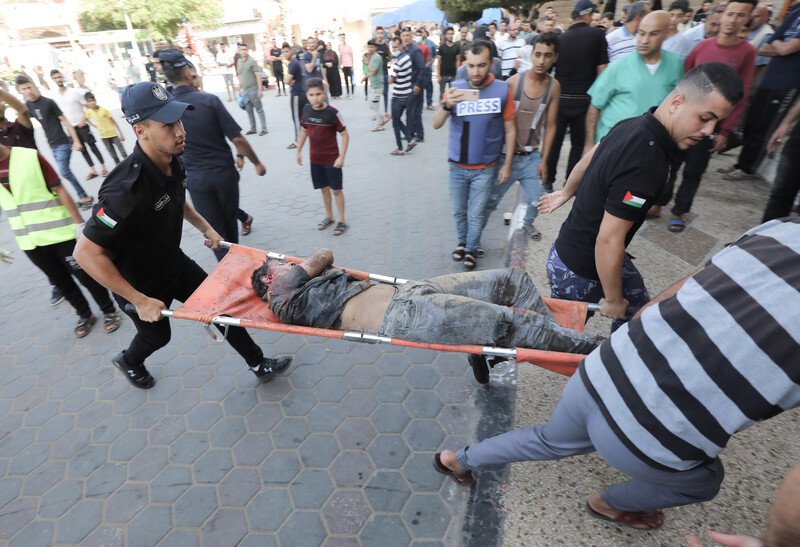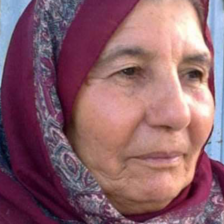The Electronic Intifada 2 November 2023

Palestinians living abroad are constantly monitoring the distressing news from Gaza.
APA imagesMy heart is aching.
I am a Palestinian from the Gaza Strip, studying in Malaysia. For the past three weeks, I have been unable to contact my family.
On 10 October, I received a message on my phone from my brother in Gaza. My family was out on the streets, he told me, and did not know where to go.
My brother contacted me just a few minutes after one of our neighbors received a warning about an imminent attack. Everyone in the building where my family lived had to evacuate within a minute.
I didn’t hear anything further from my brother, but I have been glued to the news. To my absolute horror, I later saw a report about how al-Mukhabarat Towers, north-west of Gaza City, had been destroyed completely
It became clear that Tower No. 6 was among the buildings targeted. My family lived in Tower No. 6.
On 12 October, my mother managed to send me a message on WhatsApp.
It was a relief to hear that my mother was alive. But the details in her message were extremely distressing.
My mother told me that she had endured numerous wars in Palestine, each more devastating than the previous one.
During Israel’s current war against Gaza, hospitals, mosques, and homes have all been targeted.
Families were fleeing southward, and tents were being upset for people uprooted. Schools run by the UN agency for Palestine refugees (UNRWA) were overcrowded with people seeking shelter.
She referred to a school with 7,000 people inside it – about seven times more than it could “reasonably” accommodate.
Basic necessities like bread, medicine, fuel, and electricity were cut off, my mother noted. Who knew what the future held?
That was the last message I received from my family.
I have no knowledge about how they are, even if they are alive.
I have checked the lists of martyrs published by Gaza’s health ministry. Many relatives of mine are named on the lists.
Extra layer of torment
Yet we know that many other martyrs have not been identified or even found. Large numbers of bodies are buried under rubble.
More than 330 families lived in the seven buildings that made up al-Mukhabarat Towers. All have been left homeless by Israel’s destruction.
My family used to live in another part of northern Gaza. We moved into al-Mukhabarat Towers because we believed that we would be safer there.
I grew up in al-Mukhabarat Towers. In our home, we shared laughter and sorrow.
I would sit on the balcony with my mother, watching the sea waves.
We would talk about life. We would talk about our hopes.
There is a support group for Palestinian students in Malaysia. It was set up by the embassy of the Palestinian Authority here.
One member of our group had been attending the same university as me and was actually visiting his family in Gaza when Israel launched its war. He was killed.
A doctor from Gaza who was studying for a PhD in another Malaysian university was killed along with his family.
There are several compatriots of mine studying at the same university as me. Amid a communications blackout, they are all finding it extremely difficult to keep in touch with their families.
With all our fear and anxiety, it is a major challenge to concentrate during our classes.
I am keeping my phone within constant reach, endlessly refreshing news feeds. The distance from my loved ones is adding an extra layer of torment to an already deeply worrying situation.
One image has become all-too-familiar: black or blue ink markings on the legs or wrists of martyrs, each one bearing a name.
These markings aren’t tattoos. They are a way of ensuring that the dead are not left unidentified amid the chaos and destruction.
They represent a final act of respect.
Even though I have not had contact with my family for the past three weeks, I am holding tight to the belief that they are still alive, that they are fighting against all odds, struggling with food scarcity, and searching for water to survive.
I was born in 2001. Before coming to Malaysia, I had experienced four massive Israeli attacks on Gaza.
The May 2021 attack ended on my birthday. That convinced me I have a duty to raise awareness about the injustices inflicted on Palestinians ever since the 1917 Balfour Declaration, when Britain sponsored the colonization of our homeland by the Zionist movement.
I remain committed to raising awareness.
My constant yearning for updates is exhausting. My separation from my family is heart-breaking.
Countless numbers of other Palestinians face the same reality.
Basma Almaza is a student of business administration in Malaysia.




